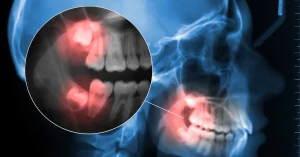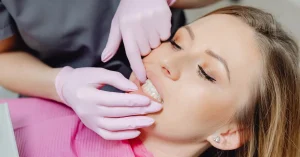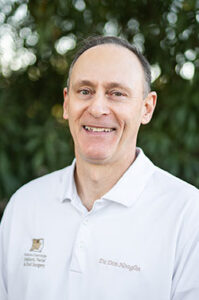Introduction
Wisdom teeth removal is one of the most common oral surgeries performed in the U.S. — yet it’s also one of the most misunderstood. Many patients expect a quick, simple recovery, only to realize afterward that there was much more to know about the process.
At Arizona Center for Oral Surgery in Glendale, Dr. Donald Hoaglin and his team often hear patients say, “I wish I’d known that before my surgery.” This guide breaks down what those patients are talking about — so you can go into your own procedure feeling confident, informed, and ready to recover comfortably.
Why Wisdom Teeth Need to Come Out

Wisdom teeth — the third set of molars — usually appear between ages 17 and 25. For many adults, these teeth grow in crooked, partially erupt, or become trapped under the gums (known as “impacted”).
When that happens, they can:
- Push against nearby teeth and cause crowding
- Lead to pain, infection, or swelling
- Damage bone or nerves near the jaw
- Create pockets where bacteria collect and cause decay
A 2023 study in the Clinical Oral Investigations Journal found that nearly 29% of tooth extractions (including wisdom teeth) are considered “complex or demanding” — not routine — highlighting why an experienced oral surgeon is essential.
What Patients Wish They Knew Before Their Surgery
Every year, thousands of people in Glendale and Phoenix have their wisdom teeth removed — and many say afterward there were a few surprises they wish they’d known in advance.
Here are the most common lessons shared by real patients and supported by recent studies.
1. Preparation Makes Recovery Easier
Many patients underestimate how much simple preparation can improve comfort afterward.
Before your surgery, plan to:
- Arrange for a friend or family member to drive you home.
- Stock up on soft foods like yogurt, soup, and smoothies.
- Take 2–3 days off from work or strenuous activity.
- Follow fasting instructions if you’ll be under general anesthesia or IV sedation.
According to a 2024 clinical report in the Journal of Patient Care and Practice, patients who carefully followed pre-operative instructions experienced fewer complications and faster recoveries than those who didn’t.
In short — the more you prepare, the smoother your recovery will be.
2. The Recovery Timeline May Surprise You
Many people expect to “bounce back” the next day, but even routine wisdom teeth removal involves a short healing period.
Here’s a general idea of what to expect:
- Day 1–2: Numbness and mild bleeding; swelling begins.
- Days 3–5: Swelling and stiffness peak, then ease up.
- Days 6–7: Stitches dissolve or are removed; diet expands.
- 2+ weeks: Most patients feel normal again.
A 2024 study in the Journal of the American Dental Association reported that patients who used non-opioid pain relievers — specifically ibuprofen and acetaminophen together — had better pain control and faster recovery than those prescribed opioids.
So while recovery takes a few days, most people are back to work or school within a week with proper care.
3. Not All Anesthesia Is the Same
A big part of what patients wish they’d known? They had options for anesthesia.
At Arizona Center for Oral Surgery, Dr. Hoaglin offers:
- Local Anesthetic — numbs the area while you stay awake.
- Nitrous Oxide (Laughing Gas) — helps you relax during the procedure.
- General or Hospital-Based Anesthesia — lets you sleep comfortably through surgery.
Each option is safe and chosen based on your comfort level, anxiety, and medical history.
A 2024 study from the National Institutes of Health (NIH) database found that patients who discussed sedation options early reported higher satisfaction and lower anxiety before surgery.
So don’t hesitate to ask about the anesthesia experience during your consultation — it’s one of the most important parts of planning your procedure.
4. Complications Are Rare — But Awareness Helps
Wisdom teeth removal is safe when performed by an experienced oral surgeon. Still, knowing potential risks helps you prepare better.
The most common issues include:
- Dry socket: When a blood clot is dislodged too soon, exposing the bone.
- Infection: Rare, but possible if bacteria enter the healing site.
- Nerve irritation: Temporary tingling that typically resolves in days to weeks.
Modern techniques — like 3D imaging, piezoelectric tools, and minimally invasive extractions — have significantly lowered complication rates. In fact, the same 2024 JPTCP study showed that minimally invasive surgical methods resulted in less swelling and pain than traditional approaches.
At Arizona Center for Oral Surgery, Dr. Hoaglin uses advanced 3D imaging and precise techniques to minimize tissue trauma and ensure smoother recoveries.
5. The Real Impact on Your Lifestyle
What surprises most patients isn’t the surgery itself — it’s the short-term lifestyle changes afterward.
You’ll need to:
- Skip the gym for about a week.
- Avoid straws, smoking, or alcohol for several days.
- Stick to soft foods and stay hydrated.
- Sleep with your head slightly elevated to reduce swelling.
Patients who plan ahead generally recover faster. A 2025 MDPI Clinical Review found that patients who allowed 3–4 days of planned rest had significantly fewer post-op issues and better healing outcomes.
Scheduling your surgery during a lighter week — or before a long weekend — can make recovery feel much easier.
The Step-by-Step Process at Arizona Center for Oral Surgery

Knowing what to expect helps ease anxiety. Here’s how Dr. Hoaglin and his team make the process comfortable and stress-free:
1. Consultation & 3D Imaging
- You’ll receive a cone-beam CT scan to evaluate your tooth and jaw structure.
- Dr. Hoaglin explains every option and answers your questions.
2. Anesthesia & Comfort Setup
- Choose from local, nitrous, or general anesthesia — all administered safely.
- You’ll be monitored closely throughout the procedure.
3. Gentle Extraction
- Using advanced, minimally invasive tools, Dr. Hoaglin removes the teeth efficiently while protecting surrounding tissue.
4. Aftercare & Support
- You’ll get clear instructions for recovery and medications.
- The office checks in with you and schedules a follow-up visit to ensure optimal healing.
Real Patient Experiences
Patients at Arizona Center for Oral Surgery often describe the experience as easier and more comfortable than expected.
“I was nervous, but the team made everything so comfortable. I barely felt anything, and my recovery was smooth.” — Patient Review, Wisdom Teeth Removal
“Dr. Hoaglin explained everything clearly and made sure I felt safe. I wish I’d done this sooner!” — Patient Review, Glendale
You can read more verified reviews from patients here.
Long-Term Benefits of Wisdom Teeth Removal
Once you’ve healed, you’ll notice lasting improvements, such as:
- Reduced risk of gum disease and decay
- Fewer infections and cysts
- Relief from jaw pressure or crowding
- Better long-term oral health
The peace of mind that comes with a healthier, pain-free smile is one of the most common “I wish I’d known” benefits patients share afterward.
Why Glendale & Phoenix Patients Trust Dr. Hoaglin
While many general dentists perform extractions, complex or impacted wisdom teeth require an oral surgeon’s precision.
A lot of practices in Glendale, AZ, offer general dentistry and implant services, but Arizona Center for Oral Surgery stands apart with:
- Full anesthesia capabilities, including hospital-based options
- Advanced 3D imaging for precision
- Specialized surgical expertise
- A focus on patient comfort and safety
For educated adults in Glendale and Phoenix seeking premium care, Dr. Hoaglin’s combination of technology and compassion provides a level of reassurance that makes all the difference.
Request Your Consultation
If your wisdom teeth are starting to cause discomfort — or if your dentist has recommended removal — choose care that feels calm, clear, and comfortable.
Request your consultation at Arizona Center for Oral Surgery today.
Our team proudly serves Glendale, Phoenix, and surrounding communities, helping patients achieve healthier smiles every day.
Frequently Asked Questions
1. How long does recovery take after wisdom teeth removal?
Most patients recover within 5–7 days. Mild swelling may last a bit longer, but full healing typically takes 2 weeks.
2. What type of anesthesia will I receive?
Dr. Hoaglin offers local anesthesia, nitrous oxide, and general anesthesia. Your choice depends on your comfort level and medical needs.
3. Can I go back to work the next day?
Light desk work may be fine after 1–2 days, but most patients prefer taking at least 2 days off to rest.
4. What foods should I avoid after surgery?
Avoid crunchy, spicy, or chewy foods. Stick to soft, cool foods like yogurt, mashed potatoes, and smoothies.
5. What are signs of complications I should watch for?
Persistent pain, bad taste, fever, or bleeding after day 3–4 could indicate dry socket or infection. Contact your oral surgeon right away.

Final Thoughts
When you know what to expect, wisdom teeth removal doesn’t have to be stressful. With the right preparation, surgeon, and aftercare, your experience can be smooth, safe, and surprisingly simple.
That’s exactly what patients across Glendale and Phoenix find at Arizona Center for Oral Surgery — expert surgical care with compassion, advanced technology, and comfort-focused recovery.
Request your consultation at Arizona Center for Oral Surgery today.
